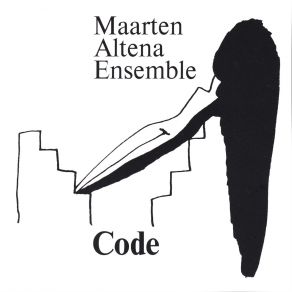Code
Download links and information about Code by Maarten Altena Ensemble. This album was released in 1991 and it belongs to Jazz, Avant Garde Jazz genres. It contains 9 tracks with total duration of 01:08:26 minutes.

|
|
|---|---|
| Artist: | Maarten Altena Ensemble |
| Release date: | 1991 |
| Genre: | Jazz, Avant Garde Jazz |
| Tracks: | 9 |
| Duration: | 01:08:26 |
| Buy it NOW at: | |
| Buy on iTunes $9.99 | |
Tracks
[Edit]| No. | Title | Length |
|---|---|---|
| 1. | Principia | 3:10 |
| 2. | Slange | 10:47 |
| 3. | Terodatilu | 7:10 |
| 4. | Tempi, Rumori, Spari | 4:52 |
| 5. | Prikkel | 8:23 |
| 6. | Scène De Mort | 6:28 |
| 7. | Stimme | 7:59 |
| 8. | Rij | 8:45 |
| 9. | Code 1 | 10:52 |
Details
[Edit]One of the most riveting things about Maarten Altena's Code ensemble is in the first track, "Principia" — vocalist Jannie Pranger's sings her verses as if she were singing an inside-out version of the song "Downtown" by Petula Clark. Given that Steve Martland wrote the tune, it's not surprising it comes from the sickliest sweet of pop culture's drawers. Of course, its refrains and the trombone being the chief melody instrument don't make it resemble the tune all that much, but nonetheless you are drawn in by this insipid pop melody that seems to still be a part of the Western cultural memory and forced to recall its near staccato phrasing before realizing that this is an art song. But this seems to be an m.o. for the Code ensemble under Altena's direction. The notion of "play" is very important to these musicians. They derive, it seems, great pleasure when playing these wacky yet endearing songs of "codified" language. Altena's been involved for a decade with systems of "code" and his new ensemble here reveals how many different sides of it he is willing to explore. He has added Pranger and guitarist Jacques Palinckx and replaced most of the woodwinds. The depth of sonic language is not multiplied so much as its width. The attack here on codified strata in music has a larger surface to work from and a greater palette of colors. But while Altena's investigations may be serious, his presentation isn't so dour that the listener cannot be entertained as well as musically engaged in the group's findings. One listen to the sequenced absurdity in "Tempi, Rumori, Spari" offers a new view of musical time and harmonic patterning. In "Scene de Morte," if there is a funeral, it's in New Orleans with its Sidney Bechet-like clarinet solos and trombone wranglings from Michael Vatcher. The bottom line is, this is the best of the Altena ensemble's adventures in recording code music. Sure, it is serious music, but it's also music that is sensual and full of pleasure for listeners.